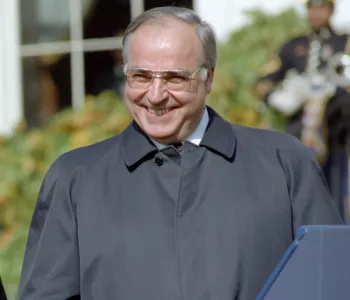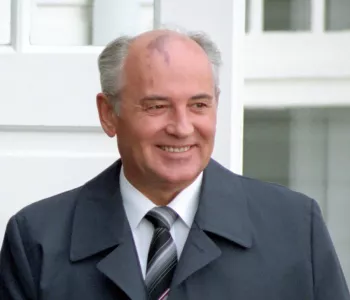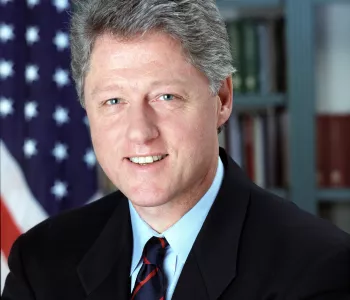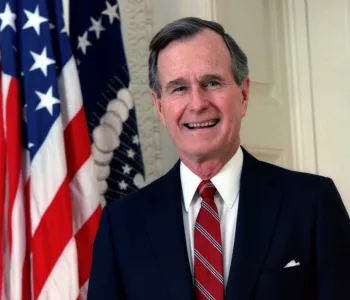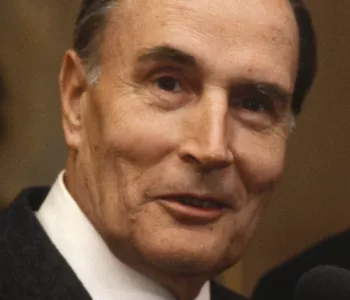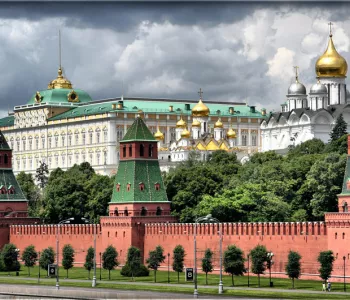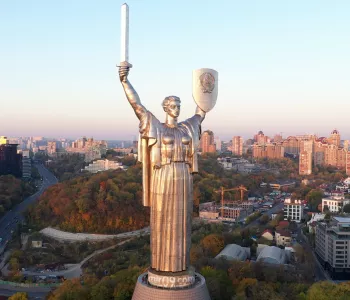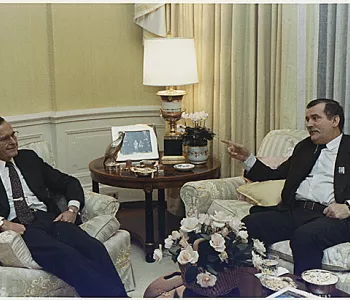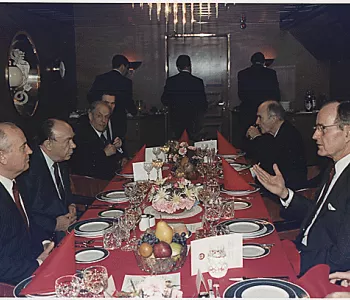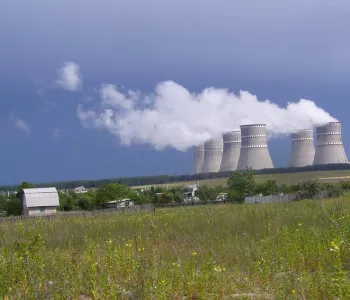d'Vinci

Yeltsin, Boris 1931- 2007
First Russian Federation President from 1991-1999.

b. February 1, 1931
Boris Nikolayevich Yeltsin became the first President of Russia in 1991, and the first democratically elected leader in the country's history.
President, Russian Federation, 1991-1999
Boris Nikolayevich Yeltsin became the first President of Russia in 1991, and the first democratically elected leader in the country's history.
President, Russian Federation, 1991-1999

Image, Yeltsin with George H. W. Bush, 1968, NARA, ARC Identifier 186462.
Yeltsin was educated at Pushkin High School in Berezniki, Perm region and the Ural Polytechnic Institute in Sverdlovsk, majoring in construction.
Member of the Communist Party of the Soviet Union (CPSU) from 1961 to July 1990, he began working in the Communist administration in 1969. In 1977 as party boss in Sverdlovsk, he ordered the destruction of the Ipatiev House where the last Tsar had been murdered. Appointed to the Politburo by Mikhail Gorbachev, Yeltsin was also "Mayor" of Moscow (First Secretary of the CPSU Moscow City Committee) from December 24, 1985 to 1987, when he was sacked from both positions after criticizing Gorbachev and the pace of reform.
The brusque manner of his criticisms of Gorbachev during meetings of the politburo violated a convention of procedure which mandated that strong criticisms be circulated beforehand to avoid personal clashes during actual meetings. Yeltsin was not exiled or imprisoned as once would have been the consequence, but demoted to the position of First Deputy Commissioner for the State Committee for Construction. Yeltsin was frightened and humiliated but plotted his revenge. His opening came with Gorbachev's establishment of the Congress of People's Deputies.
In March 1989 he was elected to the Congress of People's Deputies and gained a seat on the Supreme Soviet. In May 1990 he was appointed speaker of the Supreme Soviet of the RSFSR, in June the RSFSR declared independence and in July Yeltsin left the CPSU. In the democratic presidential elections for Russia on June 12, 1991 Yeltsin won 57 per cent of the popular vote and he took office on July 10.
On August 18, 1991 a coup against Gorbachev was started by hardline communists headed by Kryuchkov. Gorbachev was held in the Crimea while Yeltsin raced to the White House of Russia in Moscow to defy the coup. The White House was surrounded by troops but in the face of mass popular demonstrations the troops defected, and Yeltsin made a memorable speech from the turret of a tank.
By August 21 most of the coup leaders had fled Moscow and Gorbachev was 'rescued' from the Crimea and returned to Moscow. Yeltsin was hailed around the world as a hero for saving the Soviet Union from the resumption of tyranny and the world from the renewal of the Cold War.
However, by the time Gorbachev was restored to power, the Soviet power structure was in the process of collapse. In early December 1991, Ukraine voted for independence from the Soviet Union. A week later the Presidents of Russia, Ukraine, and Belarus created the Commonwealth of Independent States. On December 24, the Russian Federation took the USSR's seat in the United Nations. The next day, President Gorbachev resigned and the USSR ceased to exist.
Following the disintegration of the USSR, continued economic restructuring became one of Yeltsin's main priorities with his government overseeing a massive privatization of state-run enterprises. However, the Yeltsin government's incompetence and destructive activities of pro-inflation forces caused the Russian economy to further deteriorate. Congress of People's Deputies of Russia attempted to impeach President Yeltsin on March 26, 1993. Yeltsin's opponents gathered more than 600 votes for impeachment, but fell 72 votes short.
On September 21, 1993, Yeltsin disbanded the Supreme Soviet and Congress of People's Deputies by decree. Elections were set for December 12, 1993, but on September 21 there was a military showdown, the Russian constitutional crisis of 1993. With military help, Yeltsin held control until the elections.
In December 1994, Yeltsin ordered the military invasion of Chechnya after Chechen separatists attempted to break away from the Russian Federation. Yeltsin later withdrew federal forces from Chechnya under a 1996 peace agreement brokered by Aleksandr Lebed, then Yeltsin's security chief. The deal allowed Chechnya autonomy but not full independence. Up to 100,000 people were estimated to have been killed during the 20-month conflict.
On August 9, 1999 Yeltsin fired his Prime Minister, Sergei Stepashin, and for the fourth time, fired his entire cabinet.
Yeltsin continued as President of Russia until December 31, 1999, but the events of 1991 proved to be something of a high-water mark for him historically and personally. He resigned on December 31, 1999, naming Vladimir Putin as Acting President until new elections were held on March 26, 2000.
Yeltsin was educated at Pushkin High School in Berezniki, Perm region and the Ural Polytechnic Institute in Sverdlovsk, majoring in construction.
Member of the Communist Party of the Soviet Union (CPSU) from 1961 to July 1990, he began working in the Communist administration in 1969. In 1977 as party boss in Sverdlovsk, he ordered the destruction of the Ipatiev House where the last Tsar had been murdered. Appointed to the Politburo by Mikhail Gorbachev, Yeltsin was also "Mayor" of Moscow (First Secretary of the CPSU Moscow City Committee) from December 24, 1985 to 1987, when he was sacked from both positions after criticizing Gorbachev and the pace of reform.
The brusque manner of his criticisms of Gorbachev during meetings of the politburo violated a convention of procedure which mandated that strong criticisms be circulated beforehand to avoid personal clashes during actual meetings. Yeltsin was not exiled or imprisoned as once would have been the consequence, but demoted to the position of First Deputy Commissioner for the State Committee for Construction. Yeltsin was frightened and humiliated but plotted his revenge. His opening came with Gorbachev's establishment of the Congress of People's Deputies.
In March 1989 he was elected to the Congress of People's Deputies and gained a seat on the Supreme Soviet. In May 1990 he was appointed speaker of the Supreme Soviet of the RSFSR, in June the RSFSR declared independence and in July Yeltsin left the CPSU. In the democratic presidential elections for Russia on June 12, 1991 Yeltsin won 57 per cent of the popular vote and he took office on July 10.
On August 18, 1991 a coup against Gorbachev was started by hardline communists headed by Kryuchkov. Gorbachev was held in the Crimea while Yeltsin raced to the White House of Russia in Moscow to defy the coup. The White House was surrounded by troops but in the face of mass popular demonstrations the troops defected, and Yeltsin made a memorable speech from the turret of a tank.
By August 21 most of the coup leaders had fled Moscow and Gorbachev was 'rescued' from the Crimea and returned to Moscow. Yeltsin was hailed around the world as a hero for saving the Soviet Union from the resumption of tyranny and the world from the renewal of the Cold War.
However, by the time Gorbachev was restored to power, the Soviet power structure was in the process of collapse. In early December 1991, Ukraine voted for independence from the Soviet Union. A week later the Presidents of Russia, Ukraine, and Belarus created the Commonwealth of Independent States. On December 24, the Russian Federation took the USSR's seat in the United Nations. The next day, President Gorbachev resigned and the USSR ceased to exist.
Following the disintegration of the USSR, continued economic restructuring became one of Yeltsin's main priorities with his government overseeing a massive privatization of state-run enterprises. However, the Yeltsin government's incompetence and destructive activities of pro-inflation forces caused the Russian economy to further deteriorate. Congress of People's Deputies of Russia attempted to impeach President Yeltsin on March 26, 1993. Yeltsin's opponents gathered more than 600 votes for impeachment, but fell 72 votes short.
On September 21, 1993, Yeltsin disbanded the Supreme Soviet and Congress of People's Deputies by decree. Elections were set for December 12, 1993, but on September 21 there was a military showdown, the Russian constitutional crisis of 1993. With military help, Yeltsin held control until the elections.
In December 1994, Yeltsin ordered the military invasion of Chechnya after Chechen separatists attempted to break away from the Russian Federation. Yeltsin later withdrew federal forces from Chechnya under a 1996 peace agreement brokered by Aleksandr Lebed, then Yeltsin's security chief. The deal allowed Chechnya autonomy but not full independence. Up to 100,000 people were estimated to have been killed during the 20-month conflict.
On August 9, 1999 Yeltsin fired his Prime Minister, Sergei Stepashin, and for the fourth time, fired his entire cabinet.
Yeltsin continued as President of Russia until December 31, 1999, but the events of 1991 proved to be something of a high-water mark for him historically and personally. He resigned on December 31, 1999, naming Vladimir Putin as Acting President until new elections were held on March 26, 2000.
